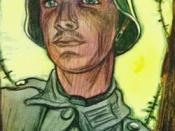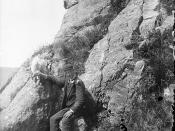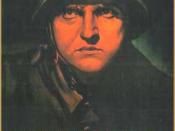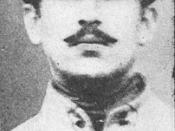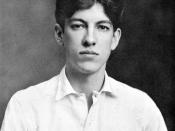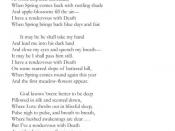Literature All Quiet On The Western Front Firstly before I compare All quiet on the western front and the poem, "I have a rendezvous with death"; I am going to describe them separately. All quiet on the western front is a story written from the perspective of a young boy who had to learn the hardships of life and war at a very early age. Before they had even gone off to college they experienced death and pain, that none of them dreamed existed in the war. They grew up extremely fast and were taken away from their previous lives forever. Even if they survived they would have nothing to go back to because they had no specific job or a family that kept them on track. They were taken when they were at a learning stage and what they learned was war. As Paul explained that Kat and other men had something to go back to, a wife and kids or a job.
Paul and his friends had nothing to go back to they were out of school, had no chosen career and the fear and pain of war would stay with them forever. It would stay with them because it affected them so deeply, they understood that they had to fight and kill but they didn't know what the reasons were. They were so used to being taught and lead in some certain direction with some restrictions, but now they were on there own with know one to guide them. Kat tried as best he could to take the kids under his wing and teach them the facts of war, but there were so many that didn't have anyone who just died out there.
"I have a rendezvous with death," written by Alan Seeger is a poem written from a point of view with more maturity which comes from age. The poem reflects his ideas of death, which are more adult in context. He looks at war completely different than Paul, it might be a few other differences but I think the biggest one is the age difference.
Now as for the difference in their opinions of death, Paul and his friends looked on death as something to be feared, hated and evaded at all costs. When the first of their friends died, it was extremely hard for them to accept death and even some went into denial. When Paul saw Kemmerich die he finally saw for himself, but it took him a long while to accept his death because he was just eighteen and he didn't yet understand. He was too young to grasp all that was going on and he even dared not to think or talk about dying because he feared going crazy and loosing all confidence in himself and in the war. Death to Paul and his friends was the end; it was never mentally accepted. Alan seeger looked on death as an appointment; he looked at it as a part of life. He placed death with one of the joys of life. He describes beauty in his poem as well as his accepted fate. "And apple-blossoms fill the air, When spring brings back blue days and fair, and the first meadow-flowers appear". All of these things are things that people enjoy, and Seeger put death along side of them. He looks at death as life, its not something to hate; he even sees death as someone taking him by the hand. Paul and his friends feared death but ultimately accepted it either with the death of a friend or their own. They tired to evade the inevitable, which ultimately caught up with them in the end. Death is not something to be feared and it is not something you can hide from. The biggest difference between All quiet on the western front and Alan Seeger's "I have a rendezvous with death" is the way the main characters look on death, and this point of view is greatly influenced by age and maturity.
